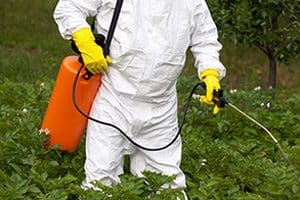
It may causes cancer in humans At the crux of the Monsanto litigation is whether, or not, the active herbicide in Roundup, glyphosate – causes cancer in humans. Various studies have found it does not. The World Health Organization (WHO) recently released a statement that glyphosate, indeed, may very well be carcinogenic. Both sides offer […]

It may causes cancer in humans At the crux of the Monsanto litigation is whether, or not, the active herbicide in Roundup, glyphosate – causes cancer in humans. Various studies have found it does not. The World Health Organization (WHO) recently released a statement that glyphosate, indeed, may very well be carcinogenic. Both sides offer compelling arguments.
Plaintiffs in Monsanto Roundup lawsuits consolidated in Northern California are seeking tissue specimens from the 1980s in an effort to further support their claim that the primary ingredient in the widely used herbicide, is capable of causing cancer in humans.
The Monsanto lawsuits exist against a litany of various allegations concerning backroom dealings within U.S. government agencies and one individual in particular, since retired, who appeared to be sensitive to Monsanto’s cause is alleged to have worked behind the scenes to suppress further investigations into glyphosate.
National law firm Parker Waichman LLP has extensive experience representing clients in product liability cases, including Monsanto’s Roundup. The firm actively monitors litigation on behalf of individuals who are seeking legal information about filing a lawsuit.
Studies involving mice appeared to show that Roundup was safe for humans, and only damaged the crop-hungry pests it was designed to repel. Those findings, according to court documents were confirmed by experimental pathologists, independent of Monsanto. Tumors found in the kidney tissue of mice were seen as rare, and not related to exposure to glyphosate.
The Environmental Protection Agency (EPA) did its own review in 1986 and confirmed the findings, remarking that glyphosate ‘isn’t likely’ to trigger cancer in humans.
However, plaintiffs in Roundup lawsuits show a different study that reveals a connection between glyphosate and cancer in humans – and have asked to see more than 1,000 slides containing kidney tissue from the original mice studied, a request that Monsanto railed against.
“Plaintiffs’ speculation that additional review might yield materially different interpretations than the prior reviews are therefore baseless and does not justify the disruption and burden imposed by their gamesmanship,” Monsanto said, in court documents, adding that it also questions the timing of the request. The defendants maintain that plaintiffs knew about the tissue slides as early as July 2015 and should have made such a request well before this spring. Monsanto is concerned that the request will delay the litigation further.
The plaintiffs, however, are undaunted, noting their request was delivered well within the time limits for discovery. The plaintiffs also hold that advances in technology, together with changes in tumor classification that have come to the fore since the original samples were studied and classified in the 1980s, carries the potential for a different outcome.
In March 2017, the European Chemicals Agency released a statement that suggests the active ingredient in Roundup (glyphosate) does not cause cancer in humans.
However, in 2015, the International Agency for Research on Cancer, an agency associated with the World Health Organization, released a classification for glyphosate as “probably carcinogenic to humans.”
In September 2016, the California Environmental Protection Agency announced it would officially list glyphosate as a known carcinogen as part of California’s Safe Drinking Water and Toxic Enforcement Act (1986). Monsanto sued the state, but the lawsuit was dismissed.
Monsanto told the Fresno County court that their right to due process had been ignored in trying to keep their product off the list, criticizing California’s Proposition 65. That was originally called the Safe Drinking Water and Toxic Enforcement Act of 1986. This requires the state to publish a list of chemicals or pollutants known to cause cancer, birth defects, or other reproductive harm and is updated every year.
 Kidney and blood abnormalities were found in rats fed one of Monsanto’s GM (genetically modified) maize, while residents in the south of the Philippines suffered mysterious illnesses when another GM maize came into flower in a nearby field for two consecutive years. Antibodies to certain proteins inserted into the GM maize were found in the villagers, according to Nevada Appeal. One-dozen cows who died after eating a third GM maize made by Syngenta, and others in the herd required slaughter due to mysterious illnesses.
Kidney and blood abnormalities were found in rats fed one of Monsanto’s GM (genetically modified) maize, while residents in the south of the Philippines suffered mysterious illnesses when another GM maize came into flower in a nearby field for two consecutive years. Antibodies to certain proteins inserted into the GM maize were found in the villagers, according to Nevada Appeal. One-dozen cows who died after eating a third GM maize made by Syngenta, and others in the herd required slaughter due to mysterious illnesses.
Farm workers and those living in proximity to farms have been speculated as being at high risk of certain cancers after exposure to glyphosate. The cancers cited included Non-Hodgkins Lymphoma, B-Cell Lymphoma, Follicular Lymphoma, as well as other lymphatic cancers.
If you or someone you know has been injured by chemicals that may have caused a disease, you may have valuable legal rights. Parker Waichman LLP offers free, no-obligation case evaluations. We urge you to contact the personal injury lawyers at 1-800-YOURLAWYER (1-800-968-7529).


